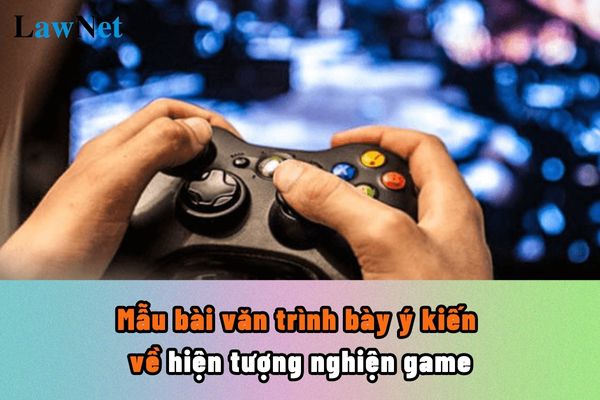Vietnam: What are the sample brief essays on giving opinions on game addiction? What are the prohibited acts for 6th-grade students?
What are the sample brief essays on giving opinions on game addiction in Vietnam?
Writing an essay on giving opinions on game addiction is a content required for 6th-grade students in Vietnam.
Students can refer to the sample brief essays on giving opinions on game addiction in Vietnam as follows:
|
Sample brief essays on giving opinions on game addiction Sample 1: Game Addiction - Disease of the Era Game addiction, a disease of the era, is becoming increasingly common, especially among students. Immersing excessively in the virtual world not only affects physical health but also leads to serious consequences on mental health and academic performance. Students addicted to games often neglect their studies and have limited social interactions, resulting in unfortunate repercussions. Sample 2: The Impact of Game Addiction on Students Game addiction is not just a mere hobby but a serious social issue, especially for students. When deeply absorbed in the virtual world, students can easily become distracted from their studies, leading to declining academic outcomes. Moreover, prolonged sitting in front of computer or mobile screens can lead to health issues like myopia, back pain, and neck strain. Sample 3: The Role of Families in Preventing Game Addiction The family is the first and most important environment for educating children. Parents need to spend time talking, sharing with their children, and understanding their interests and aspirations. Additionally, families should create a warm, happy atmosphere, allowing children to feel loved and cared for. Sample 4: The Role of Schools in Preventing Game Addiction Schools play an important role in educating students on the harms of game addiction. Teachers should organize class activities and discussions to help students recognize this issue clearly. Sample 5: Comprehensive Solutions to Address the Game Addiction Problem To tackle the issue of game addiction among students, a collective effort from society is needed. Besides families and schools, governing bodies need to implement suitable game management policies, restricting violent or unhealthy games. |
*Note: The information on sample brief essays on giving opinions on game addiction in Vietnam is for reference only./.

What are the sample brief essays on giving opinions on game addiction in Vietnam?
What are the requirements on language proficiency in Literature in Vietnam?
According to the general education program for Literature, issued under Circular 32/2018/TT-BGDDT, the educational orientation of Literature is as follows:
- Language Proficiency
Being able to apply Vietnamese language knowledge with individual experiences and reasoning skills to understand texts; knowing how to read texts according to type and genre; and understanding both explicit and implicit contents of the text.
Recognizing and initially analyzing and evaluating the contents and distinctive expressive features of texts; comparing one text with another, relating to personal life experiences; thereby gaining personal perspectives and insights on life, enriching spiritual life.
In grades 6 and 7: being able to write narrative, descriptive, and expressive essays; initially being able to write argumentative, explanatory, and practical writings. In grades 8 and 9: being able to write comprehensive narrative, argumentative, and explanatory essays, following steps, and incorporating expressive methods.
Writing narrative texts focused on creatively recounting read stories; witnessed or participated events; imagined stories combined with descriptive and expressive elements; descriptive texts with a focus on describing living activities; expressive texts related to scenery, people, and expressing feelings about literary works; being able to create poems to recognize characteristics of some familiar poetic forms; writing argumentative texts on issues that require personal thoughts and opinions, demanding relatively simple reasoning processes with easily accessible evidence; writing explanatory texts on issues close to the students' life and understanding with common structure; completing some forms of documents, drafting some practical writings such as work memos, emails, reports, advertisements, and interviews; writing correctly process, knowing how to find resources to meet writing requirements; understanding intellectual property rights, and how to cite documents.
Presenting ideas and emotions clearly; having confidence when speaking in front of others; using appropriate language and gestures; narrating clearly the stories read or heard; sharing emotions, attitudes, experiences, and ideas about discussed issues; discussing opinions on read or heard issues; explaining an object or process; knowing how to speak appropriately for purposes, audiences, and communication contexts; using images, symbols, charts, etc., to present issues effectively.
Listening and understanding with appropriate attitudes, summarizing content; recognizing and initially evaluating the reasoning and evidence used by the speaker; recognizing the speaker's emotions; and knowing how to respond effectively to what has been heard.
What are the prohibited acts for 6th-grade students in Vietnam?
Prohibited acts for 6th-grade students according to Article 37 of the charter of lower secondary schools, upper secondary schools, and multi-level schools issued with Circular 32/2020/TT-BGDDT include:
1. Disrespect the dignity, honor or bodily integrity of teachers, officials and staff of their schools, other people and other students.
2. Act dishonestly in learning, examinations or admission process.
3. Buy, sell or use alcohol, tobacco, drugs, other stimulants, firecrackers or explosives.
4. Use mobile phones and other devices in class for purposes other than learning and without the teacher's permission.
5. Fight or disrupt public or school order or security.
6. Use or exchange cultural products that incite violence or contain indecent materials; use toys or play games that impede their own healthy development.
7. Students shall not commit other prohibited acts provided for by regulations of law.

